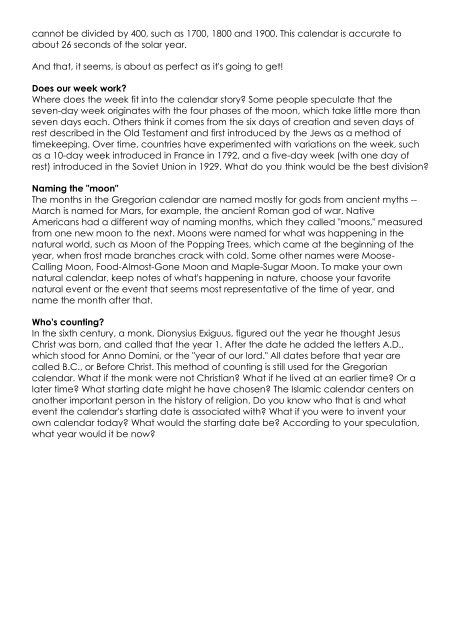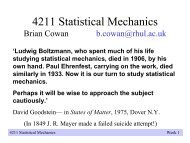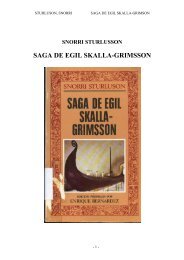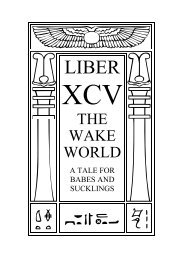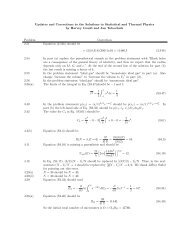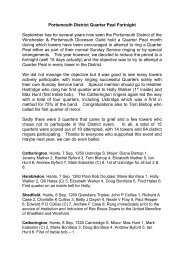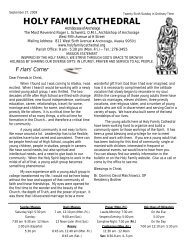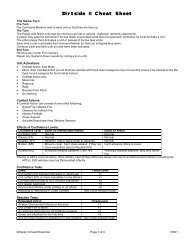Usually at this time of year we have - WebRing
Usually at this time of year we have - WebRing
Usually at this time of year we have - WebRing
You also want an ePaper? Increase the reach of your titles
YUMPU automatically turns print PDFs into web optimized ePapers that Google loves.
cannot be divided by 400, such as 1700, 1800 and 1900. This calendar is accur<strong>at</strong>e to<br />
about 26 seconds <strong>of</strong> the solar <strong>year</strong>.<br />
And th<strong>at</strong>, it seems, is about as perfect as it's going to get!<br />
Does our <strong>we</strong>ek work?<br />
Where does the <strong>we</strong>ek fit into the calendar story? Some people specul<strong>at</strong>e th<strong>at</strong> the<br />
seven-day <strong>we</strong>ek origin<strong>at</strong>es with the four phases <strong>of</strong> the moon, which take little more than<br />
seven days each. Others think it comes from the six days <strong>of</strong> cre<strong>at</strong>ion and seven days <strong>of</strong><br />
rest described in the Old Testament and first introduced by the Jews as a method <strong>of</strong><br />
<strong>time</strong>keeping. Over <strong>time</strong>, countries <strong>have</strong> experimented with vari<strong>at</strong>ions on the <strong>we</strong>ek, such<br />
as a 10-day <strong>we</strong>ek introduced in France in 1792, and a five-day <strong>we</strong>ek (with one day <strong>of</strong><br />
rest) introduced in the Soviet Union in 1929. Wh<strong>at</strong> do you think would be the best division?<br />
Naming the "moon"<br />
The months in the Gregorian calendar are named mostly for gods from ancient myths --<br />
March is named for Mars, for example, the ancient Roman god <strong>of</strong> war. N<strong>at</strong>ive<br />
Americans had a different way <strong>of</strong> naming months, which they called "moons," measured<br />
from one new moon to the next. Moons <strong>we</strong>re named for wh<strong>at</strong> was happening in the<br />
n<strong>at</strong>ural world, such as Moon <strong>of</strong> the Popping Trees, which came <strong>at</strong> the beginning <strong>of</strong> the<br />
<strong>year</strong>, when frost made branches crack with cold. Some other names <strong>we</strong>re Moose-<br />
Calling Moon, Food-Almost-Gone Moon and Maple-Sugar Moon. To make your own<br />
n<strong>at</strong>ural calendar, keep notes <strong>of</strong> wh<strong>at</strong>'s happening in n<strong>at</strong>ure, choose your favorite<br />
n<strong>at</strong>ural event or the event th<strong>at</strong> seems most represent<strong>at</strong>ive <strong>of</strong> the <strong>time</strong> <strong>of</strong> <strong>year</strong>, and<br />
name the month after th<strong>at</strong>.<br />
Who's counting?<br />
In the sixth century, a monk, Dionysius Exiguus, figured out the <strong>year</strong> he thought Jesus<br />
Christ was born, and called th<strong>at</strong> the <strong>year</strong> 1. After the d<strong>at</strong>e he added the letters A.D.,<br />
which stood for Anno Domini, or the "<strong>year</strong> <strong>of</strong> our lord." All d<strong>at</strong>es before th<strong>at</strong> <strong>year</strong> are<br />
called B.C., or Before Christ. This method <strong>of</strong> counting is still used for the Gregorian<br />
calendar. Wh<strong>at</strong> if the monk <strong>we</strong>re not Christian? Wh<strong>at</strong> if he lived <strong>at</strong> an earlier <strong>time</strong>? Or a<br />
l<strong>at</strong>er <strong>time</strong>? Wh<strong>at</strong> starting d<strong>at</strong>e might he <strong>have</strong> chosen? The Islamic calendar centers on<br />
another important person in the history <strong>of</strong> religion. Do you know who th<strong>at</strong> is and wh<strong>at</strong><br />
event the calendar's starting d<strong>at</strong>e is associ<strong>at</strong>ed with? Wh<strong>at</strong> if you <strong>we</strong>re to invent your<br />
own calendar today? Wh<strong>at</strong> would the starting d<strong>at</strong>e be? According to your specul<strong>at</strong>ion,<br />
wh<strong>at</strong> <strong>year</strong> would it be now?


